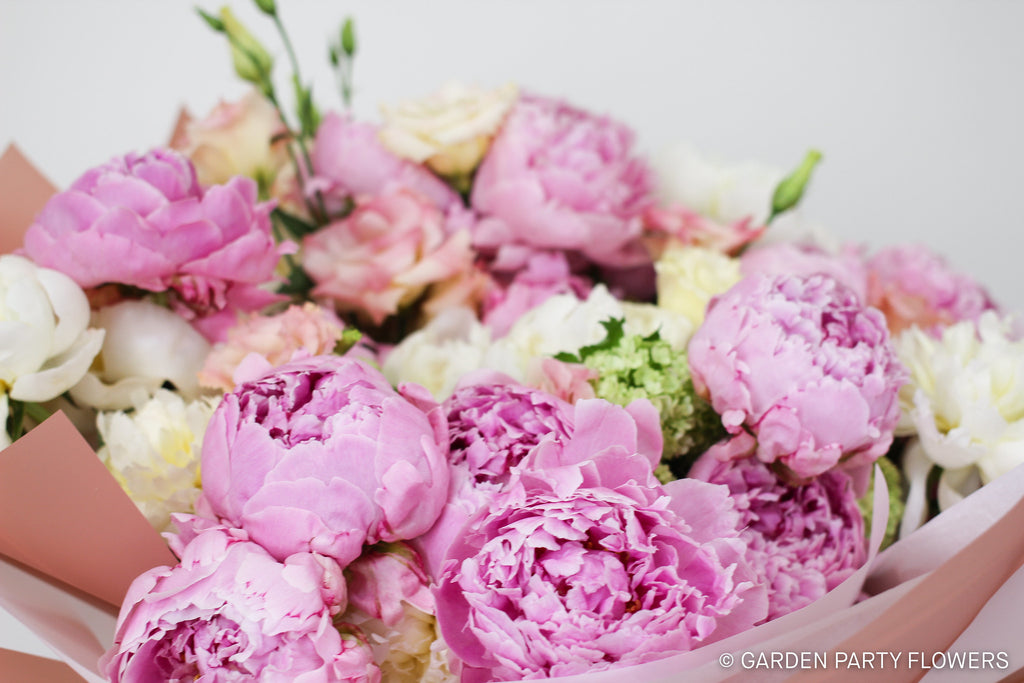In the realm of flowers, few blooms captivate the senses quite like the peony. No flower is requested more (we can't keep count, but trust us)! With their lush, voluminous petals and soft fragrance, peonies have long been idolized as a symbol of romance, prosperity, and good fortune. Each spring, these blossoms emerge, adorning gardens and bouquets with their coveted allure.
History and Symbolism
Peonies boast a storied past steeped in mythology, folklore, and cultural significance. Originating in Asia, particularly China and Japan, they have been cultivated for over two millennia. Revered for their beauty and medicinal properties, peonies held a revered status in Chinese imperial gardens, often symbolizing wealth, honour, and nobility.
In Greek mythology, Peon, the physician to the gods, gave his name to the flower. According to legend, Peon used the peony's healing properties to treat the wounds of gods and heroes. This association with healing led to the peony being linked to good health and wellbeing.
Across cultures, peonies have been emblematic of prosperity, honor, and a happy marriage, making them a popular choice in bridal bouquets and wedding decor. Their lush appearance also earned them the moniker "King of Flowers," further solidifying their status as 'botanical royalty'.
Growing Season
Peonies typically bloom in late spring to early summer. The exact timing varies depending on the variety and climate, but generally, peonies bloom from April to June in the Northern Hemisphere. There are over 30 varieties of this precious and beloved flower!
For avid gardeners, peonies offer the joy of anticipation as they emerge from their winter sleep, unfurling their sumptuous blooms in an array of hues, including shades of pink, purple, white, red, and even coral. With proper care and attention, peony plants can thrive for decades, rewarding gardeners with their stunning blossoms year after year.
They aren't a simple flower, but they are worth it! Here are some things to know about these special blooms:
Upsides:
- Beauty: Peonies are renowned for their breathtaking beauty, lush and layered petals that exude romance and elegance.
- Fragrance: Many peony varieties emit a delightful fragrance, filling the air with their sweet yet soft scent.
- Longevity: Once established, peonies are resilient perennials that can grace gardens with their blooms for generations.
- Versatility: Whether used in floral arrangements, bouquets, or as garden focal points, peonies add a touch of luxury and sophistication to any setting.
Downsides:
- Short Bloom Period: Peonies have a relatively brief bloom period, typically lasting only a few weeks. Once cut and added to a floral arrangement, bouquet or bridal bouquet - they start wilting a more quickly than anyone would like.
- Susceptible to Pests and Diseases: Peonies may fall prey to pests like ants and diseases such as botrytis blight if not properly cared for.
- Slow Growth: Peonies can be slow to establish and may take a few years to reach their full blooming potential, requiring patience from gardeners.
Fun Facts
- Ants and Peonies: Contrary to popular belief, ants are not necessary for peonies to bloom. They are attracted to the nectar found on peony buds, but they do not harm the plant or affect its flowering.
- Peony Festivals: Across the globe, numerous peony festivals celebrate the beauty and cultural significance of these majestic flowers, offering visitors the chance to admire stunning floral displays and learn about different peony varieties.
- Tree Peonies: While herbaceous peonies are more common, tree peonies (Paeonia suffruticosa) are a distinct species prized for their woody stems and large, showy blooms. Originating in China, tree peonies have been cultivated for centuries and symbolize prosperity and happiness.
In conclusion, peonies stand as timeless symbols of beauty, grace, and abundance. These flowers continue to captivate hearts and minds with their presence. Whether gracing gardens or adorning bouquets, peonies remind us of the joy found in nature.
Each year as florists we await the endless "Do you have peonies yet?".
